Reflective Essay: Mental Health Nursing in Psychiatric Care Unit
VerifiedAdded on 2022/09/13
|10
|2996
|23
Essay
AI Summary
This essay provides a critical reflection on a clinical incident encountered during a nursing placement in a Psychiatric Intensive Care Unit (PICU). The student nurse focuses on a patient diagnosed with psychosis who stopped taking medication and withdrew from social interaction. The essay employs Gibb's reflective cycle to analyze the incident, detailing the student's feelings, evaluations of the situation, and linking the experience to psychological theory and evidence-based practice. The analysis explores the patient's potential lack of awareness of their illness, the potential for catatonia, and the importance of communication and patient education. The essay also includes an action plan for managing similar situations in the future, emphasizing the need for professional development and adherence to the Nursing and Midwifery Council (NMC) Code of Professional Conduct. The student reflects on the development of communication skills and the importance of providing the best possible care to patients with mental health conditions.
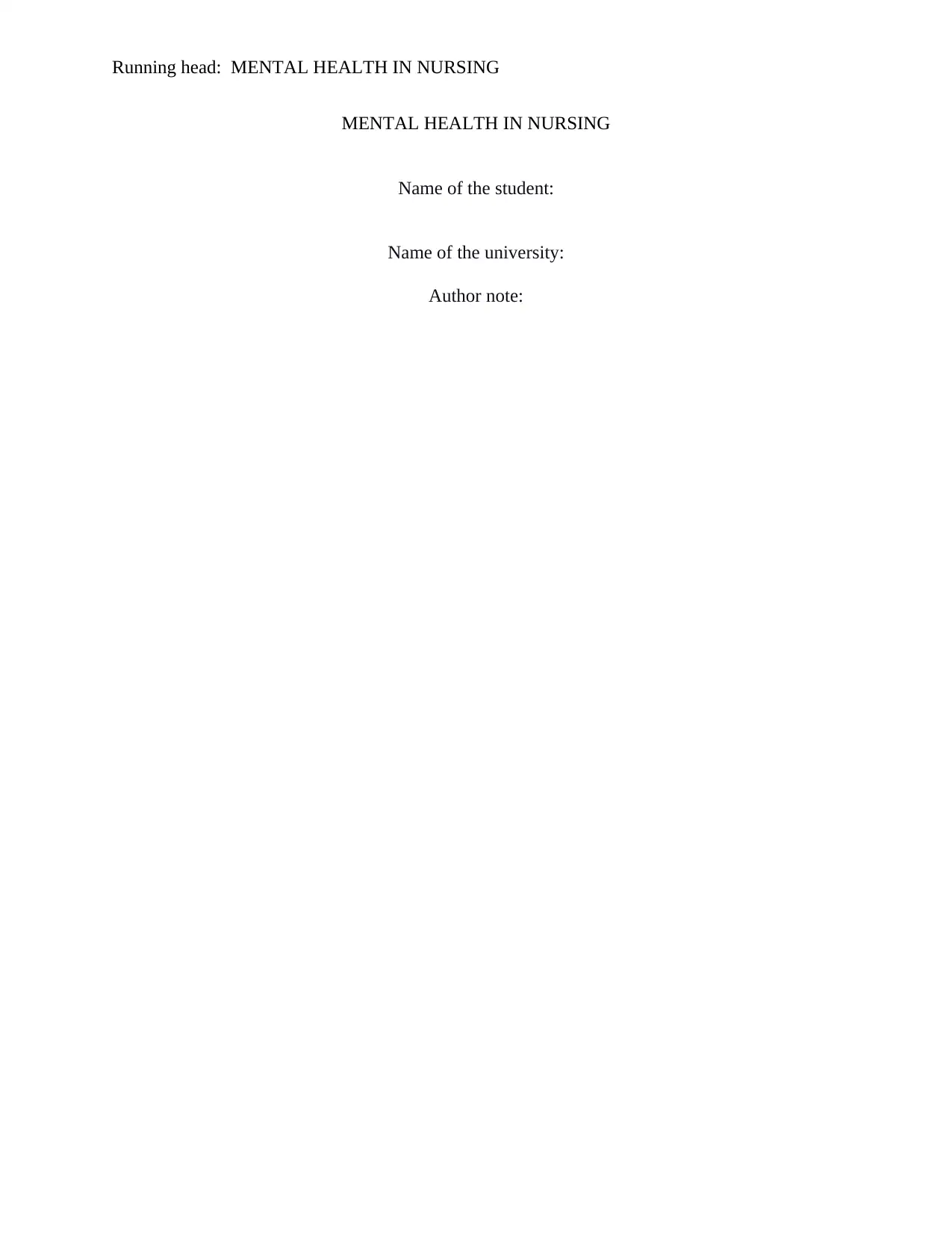
Running head: MENTAL HEALTH IN NURSING
MENTAL HEALTH IN NURSING
Name of the student:
Name of the university:
Author note:
MENTAL HEALTH IN NURSING
Name of the student:
Name of the university:
Author note:
Paraphrase This Document
Need a fresh take? Get an instant paraphrase of this document with our AI Paraphraser
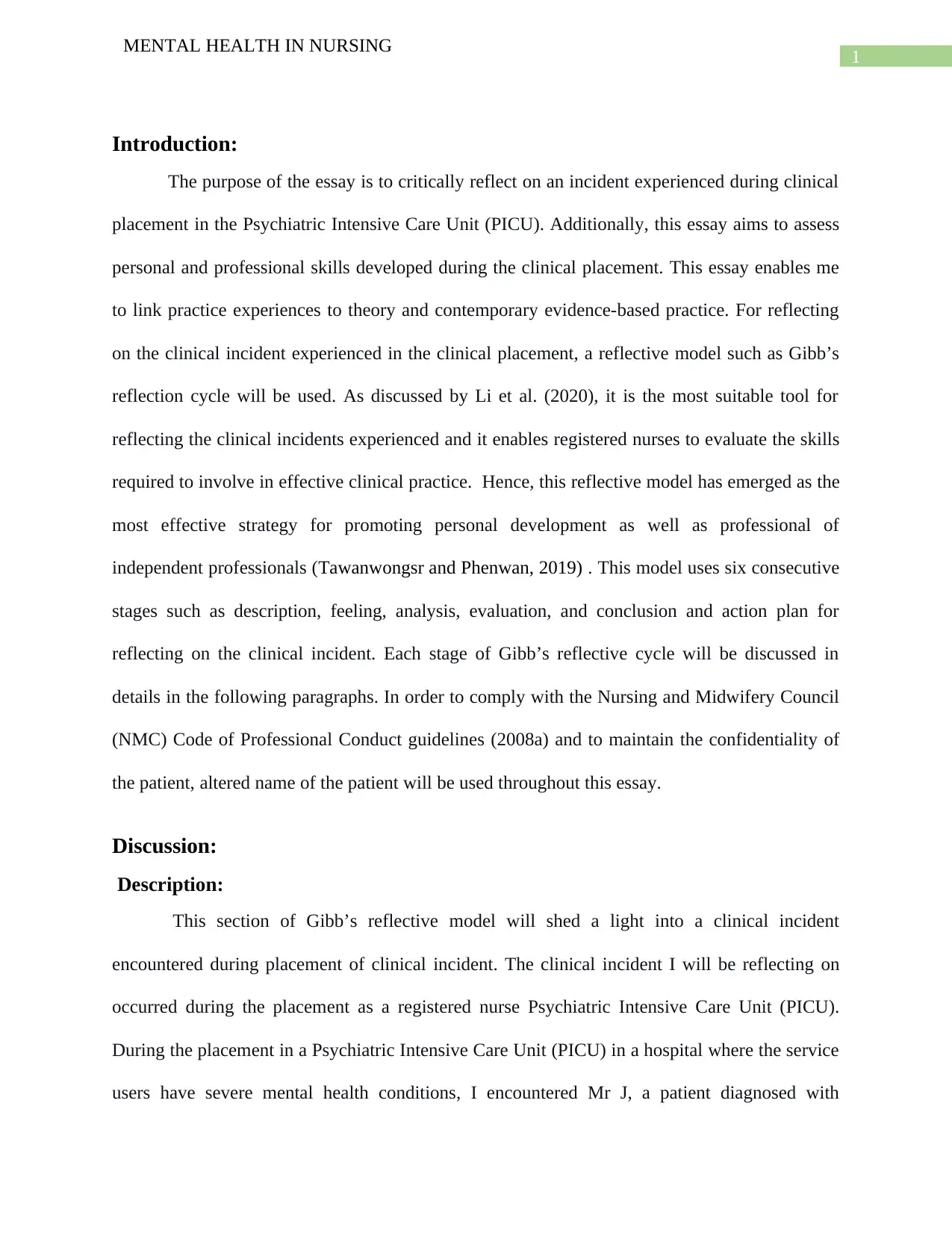
1
MENTAL HEALTH IN NURSING
Introduction:
The purpose of the essay is to critically reflect on an incident experienced during clinical
placement in the Psychiatric Intensive Care Unit (PICU). Additionally, this essay aims to assess
personal and professional skills developed during the clinical placement. This essay enables me
to link practice experiences to theory and contemporary evidence-based practice. For reflecting
on the clinical incident experienced in the clinical placement, a reflective model such as Gibb’s
reflection cycle will be used. As discussed by Li et al. (2020), it is the most suitable tool for
reflecting the clinical incidents experienced and it enables registered nurses to evaluate the skills
required to involve in effective clinical practice. Hence, this reflective model has emerged as the
most effective strategy for promoting personal development as well as professional of
independent professionals (Tawanwongsr and Phenwan, 2019) . This model uses six consecutive
stages such as description, feeling, analysis, evaluation, and conclusion and action plan for
reflecting on the clinical incident. Each stage of Gibb’s reflective cycle will be discussed in
details in the following paragraphs. In order to comply with the Nursing and Midwifery Council
(NMC) Code of Professional Conduct guidelines (2008a) and to maintain the confidentiality of
the patient, altered name of the patient will be used throughout this essay.
Discussion:
Description:
This section of Gibb’s reflective model will shed a light into a clinical incident
encountered during placement of clinical incident. The clinical incident I will be reflecting on
occurred during the placement as a registered nurse Psychiatric Intensive Care Unit (PICU).
During the placement in a Psychiatric Intensive Care Unit (PICU) in a hospital where the service
users have severe mental health conditions, I encountered Mr J, a patient diagnosed with
MENTAL HEALTH IN NURSING
Introduction:
The purpose of the essay is to critically reflect on an incident experienced during clinical
placement in the Psychiatric Intensive Care Unit (PICU). Additionally, this essay aims to assess
personal and professional skills developed during the clinical placement. This essay enables me
to link practice experiences to theory and contemporary evidence-based practice. For reflecting
on the clinical incident experienced in the clinical placement, a reflective model such as Gibb’s
reflection cycle will be used. As discussed by Li et al. (2020), it is the most suitable tool for
reflecting the clinical incidents experienced and it enables registered nurses to evaluate the skills
required to involve in effective clinical practice. Hence, this reflective model has emerged as the
most effective strategy for promoting personal development as well as professional of
independent professionals (Tawanwongsr and Phenwan, 2019) . This model uses six consecutive
stages such as description, feeling, analysis, evaluation, and conclusion and action plan for
reflecting on the clinical incident. Each stage of Gibb’s reflective cycle will be discussed in
details in the following paragraphs. In order to comply with the Nursing and Midwifery Council
(NMC) Code of Professional Conduct guidelines (2008a) and to maintain the confidentiality of
the patient, altered name of the patient will be used throughout this essay.
Discussion:
Description:
This section of Gibb’s reflective model will shed a light into a clinical incident
encountered during placement of clinical incident. The clinical incident I will be reflecting on
occurred during the placement as a registered nurse Psychiatric Intensive Care Unit (PICU).
During the placement in a Psychiatric Intensive Care Unit (PICU) in a hospital where the service
users have severe mental health conditions, I encountered Mr J, a patient diagnosed with
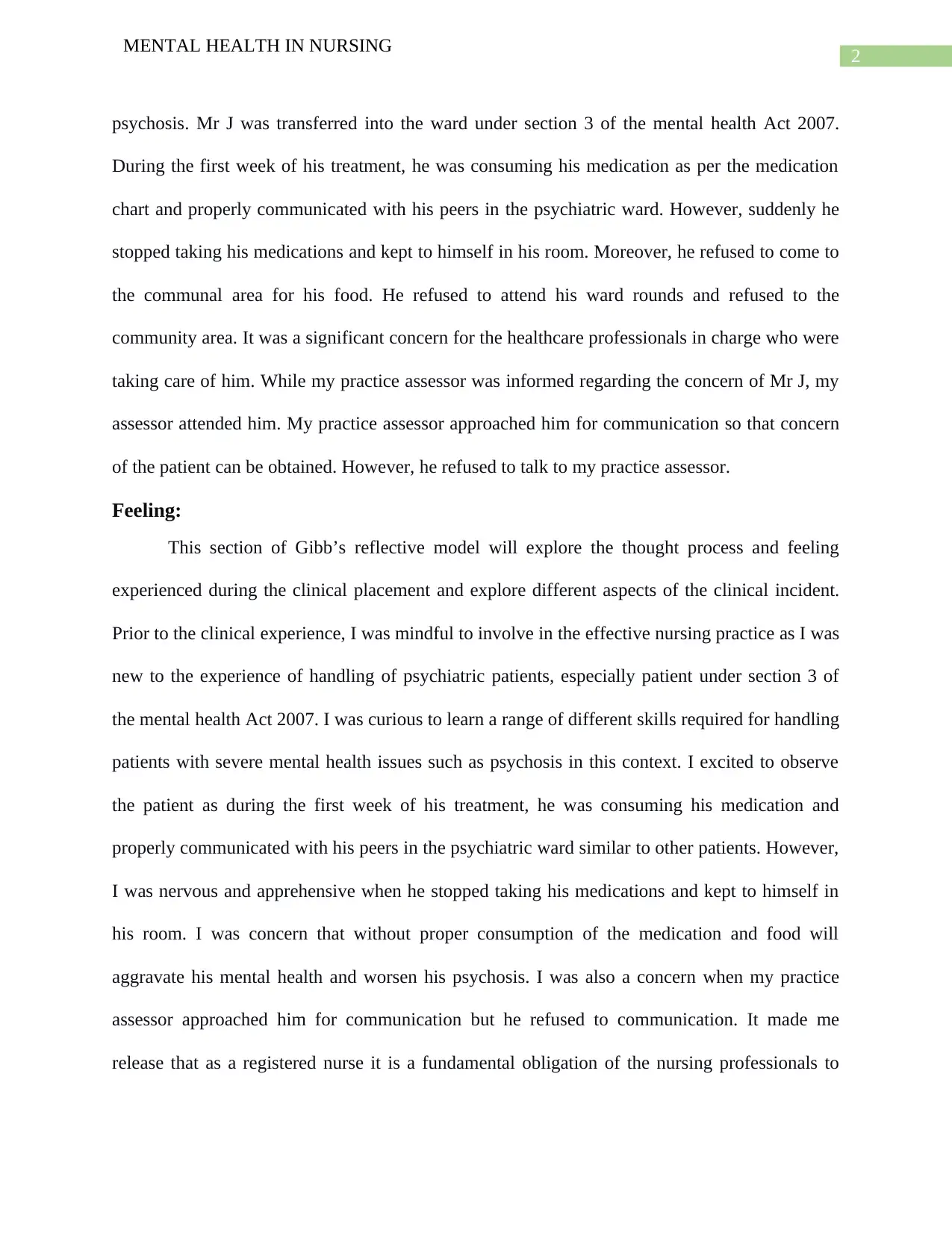
2
MENTAL HEALTH IN NURSING
psychosis. Mr J was transferred into the ward under section 3 of the mental health Act 2007.
During the first week of his treatment, he was consuming his medication as per the medication
chart and properly communicated with his peers in the psychiatric ward. However, suddenly he
stopped taking his medications and kept to himself in his room. Moreover, he refused to come to
the communal area for his food. He refused to attend his ward rounds and refused to the
community area. It was a significant concern for the healthcare professionals in charge who were
taking care of him. While my practice assessor was informed regarding the concern of Mr J, my
assessor attended him. My practice assessor approached him for communication so that concern
of the patient can be obtained. However, he refused to talk to my practice assessor.
Feeling:
This section of Gibb’s reflective model will explore the thought process and feeling
experienced during the clinical placement and explore different aspects of the clinical incident.
Prior to the clinical experience, I was mindful to involve in the effective nursing practice as I was
new to the experience of handling of psychiatric patients, especially patient under section 3 of
the mental health Act 2007. I was curious to learn a range of different skills required for handling
patients with severe mental health issues such as psychosis in this context. I excited to observe
the patient as during the first week of his treatment, he was consuming his medication and
properly communicated with his peers in the psychiatric ward similar to other patients. However,
I was nervous and apprehensive when he stopped taking his medications and kept to himself in
his room. I was concern that without proper consumption of the medication and food will
aggravate his mental health and worsen his psychosis. I was also a concern when my practice
assessor approached him for communication but he refused to communication. It made me
release that as a registered nurse it is a fundamental obligation of the nursing professionals to
MENTAL HEALTH IN NURSING
psychosis. Mr J was transferred into the ward under section 3 of the mental health Act 2007.
During the first week of his treatment, he was consuming his medication as per the medication
chart and properly communicated with his peers in the psychiatric ward. However, suddenly he
stopped taking his medications and kept to himself in his room. Moreover, he refused to come to
the communal area for his food. He refused to attend his ward rounds and refused to the
community area. It was a significant concern for the healthcare professionals in charge who were
taking care of him. While my practice assessor was informed regarding the concern of Mr J, my
assessor attended him. My practice assessor approached him for communication so that concern
of the patient can be obtained. However, he refused to talk to my practice assessor.
Feeling:
This section of Gibb’s reflective model will explore the thought process and feeling
experienced during the clinical placement and explore different aspects of the clinical incident.
Prior to the clinical experience, I was mindful to involve in the effective nursing practice as I was
new to the experience of handling of psychiatric patients, especially patient under section 3 of
the mental health Act 2007. I was curious to learn a range of different skills required for handling
patients with severe mental health issues such as psychosis in this context. I excited to observe
the patient as during the first week of his treatment, he was consuming his medication and
properly communicated with his peers in the psychiatric ward similar to other patients. However,
I was nervous and apprehensive when he stopped taking his medications and kept to himself in
his room. I was concern that without proper consumption of the medication and food will
aggravate his mental health and worsen his psychosis. I was also a concern when my practice
assessor approached him for communication but he refused to communication. It made me
release that as a registered nurse it is a fundamental obligation of the nursing professionals to
⊘ This is a preview!⊘
Do you want full access?
Subscribe today to unlock all pages.

Trusted by 1+ million students worldwide
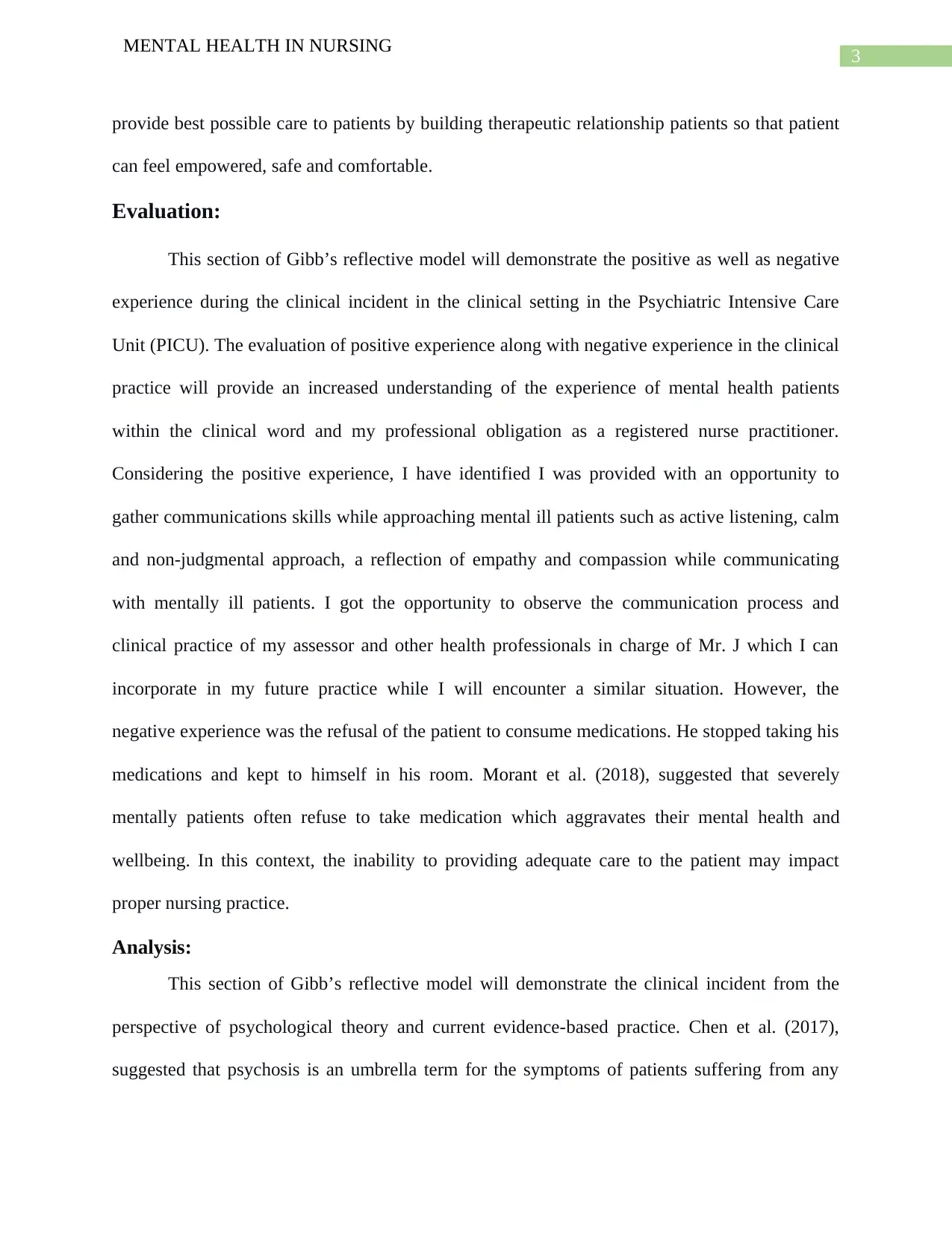
3
MENTAL HEALTH IN NURSING
provide best possible care to patients by building therapeutic relationship patients so that patient
can feel empowered, safe and comfortable.
Evaluation:
This section of Gibb’s reflective model will demonstrate the positive as well as negative
experience during the clinical incident in the clinical setting in the Psychiatric Intensive Care
Unit (PICU). The evaluation of positive experience along with negative experience in the clinical
practice will provide an increased understanding of the experience of mental health patients
within the clinical word and my professional obligation as a registered nurse practitioner.
Considering the positive experience, I have identified I was provided with an opportunity to
gather communications skills while approaching mental ill patients such as active listening, calm
and non-judgmental approach, a reflection of empathy and compassion while communicating
with mentally ill patients. I got the opportunity to observe the communication process and
clinical practice of my assessor and other health professionals in charge of Mr. J which I can
incorporate in my future practice while I will encounter a similar situation. However, the
negative experience was the refusal of the patient to consume medications. He stopped taking his
medications and kept to himself in his room. Morant et al. (2018), suggested that severely
mentally patients often refuse to take medication which aggravates their mental health and
wellbeing. In this context, the inability to providing adequate care to the patient may impact
proper nursing practice.
Analysis:
This section of Gibb’s reflective model will demonstrate the clinical incident from the
perspective of psychological theory and current evidence-based practice. Chen et al. (2017),
suggested that psychosis is an umbrella term for the symptoms of patients suffering from any
MENTAL HEALTH IN NURSING
provide best possible care to patients by building therapeutic relationship patients so that patient
can feel empowered, safe and comfortable.
Evaluation:
This section of Gibb’s reflective model will demonstrate the positive as well as negative
experience during the clinical incident in the clinical setting in the Psychiatric Intensive Care
Unit (PICU). The evaluation of positive experience along with negative experience in the clinical
practice will provide an increased understanding of the experience of mental health patients
within the clinical word and my professional obligation as a registered nurse practitioner.
Considering the positive experience, I have identified I was provided with an opportunity to
gather communications skills while approaching mental ill patients such as active listening, calm
and non-judgmental approach, a reflection of empathy and compassion while communicating
with mentally ill patients. I got the opportunity to observe the communication process and
clinical practice of my assessor and other health professionals in charge of Mr. J which I can
incorporate in my future practice while I will encounter a similar situation. However, the
negative experience was the refusal of the patient to consume medications. He stopped taking his
medications and kept to himself in his room. Morant et al. (2018), suggested that severely
mentally patients often refuse to take medication which aggravates their mental health and
wellbeing. In this context, the inability to providing adequate care to the patient may impact
proper nursing practice.
Analysis:
This section of Gibb’s reflective model will demonstrate the clinical incident from the
perspective of psychological theory and current evidence-based practice. Chen et al. (2017),
suggested that psychosis is an umbrella term for the symptoms of patients suffering from any
Paraphrase This Document
Need a fresh take? Get an instant paraphrase of this document with our AI Paraphraser
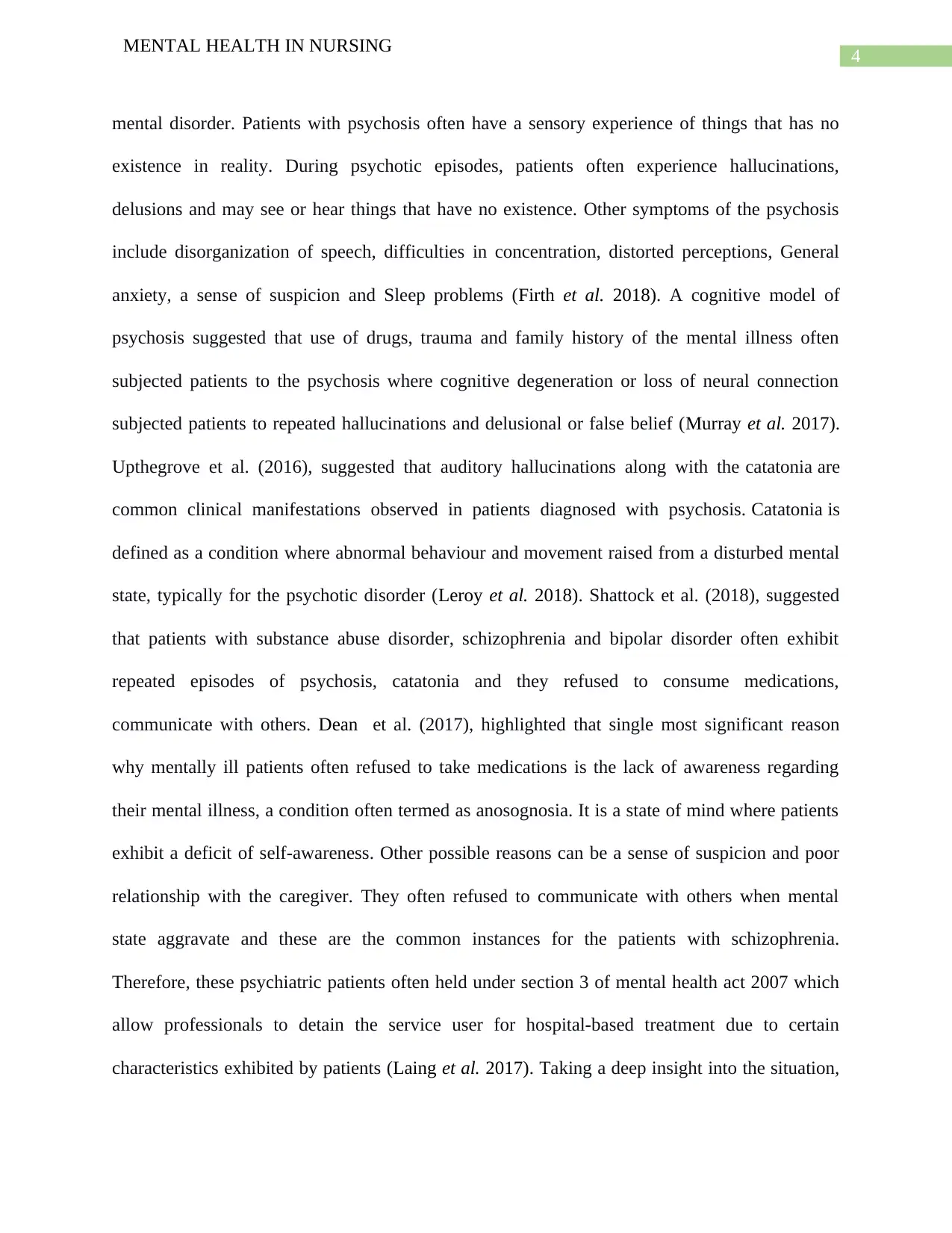
4
MENTAL HEALTH IN NURSING
mental disorder. Patients with psychosis often have a sensory experience of things that has no
existence in reality. During psychotic episodes, patients often experience hallucinations,
delusions and may see or hear things that have no existence. Other symptoms of the psychosis
include disorganization of speech, difficulties in concentration, distorted perceptions, General
anxiety, a sense of suspicion and Sleep problems (Firth et al. 2018). A cognitive model of
psychosis suggested that use of drugs, trauma and family history of the mental illness often
subjected patients to the psychosis where cognitive degeneration or loss of neural connection
subjected patients to repeated hallucinations and delusional or false belief (Murray et al. 2017).
Upthegrove et al. (2016), suggested that auditory hallucinations along with the catatonia are
common clinical manifestations observed in patients diagnosed with psychosis. Catatonia is
defined as a condition where abnormal behaviour and movement raised from a disturbed mental
state, typically for the psychotic disorder (Leroy et al. 2018). Shattock et al. (2018), suggested
that patients with substance abuse disorder, schizophrenia and bipolar disorder often exhibit
repeated episodes of psychosis, catatonia and they refused to consume medications,
communicate with others. Dean et al. (2017), highlighted that single most significant reason
why mentally ill patients often refused to take medications is the lack of awareness regarding
their mental illness, a condition often termed as anosognosia. It is a state of mind where patients
exhibit a deficit of self-awareness. Other possible reasons can be a sense of suspicion and poor
relationship with the caregiver. They often refused to communicate with others when mental
state aggravate and these are the common instances for the patients with schizophrenia.
Therefore, these psychiatric patients often held under section 3 of mental health act 2007 which
allow professionals to detain the service user for hospital-based treatment due to certain
characteristics exhibited by patients (Laing et al. 2017). Taking a deep insight into the situation,
MENTAL HEALTH IN NURSING
mental disorder. Patients with psychosis often have a sensory experience of things that has no
existence in reality. During psychotic episodes, patients often experience hallucinations,
delusions and may see or hear things that have no existence. Other symptoms of the psychosis
include disorganization of speech, difficulties in concentration, distorted perceptions, General
anxiety, a sense of suspicion and Sleep problems (Firth et al. 2018). A cognitive model of
psychosis suggested that use of drugs, trauma and family history of the mental illness often
subjected patients to the psychosis where cognitive degeneration or loss of neural connection
subjected patients to repeated hallucinations and delusional or false belief (Murray et al. 2017).
Upthegrove et al. (2016), suggested that auditory hallucinations along with the catatonia are
common clinical manifestations observed in patients diagnosed with psychosis. Catatonia is
defined as a condition where abnormal behaviour and movement raised from a disturbed mental
state, typically for the psychotic disorder (Leroy et al. 2018). Shattock et al. (2018), suggested
that patients with substance abuse disorder, schizophrenia and bipolar disorder often exhibit
repeated episodes of psychosis, catatonia and they refused to consume medications,
communicate with others. Dean et al. (2017), highlighted that single most significant reason
why mentally ill patients often refused to take medications is the lack of awareness regarding
their mental illness, a condition often termed as anosognosia. It is a state of mind where patients
exhibit a deficit of self-awareness. Other possible reasons can be a sense of suspicion and poor
relationship with the caregiver. They often refused to communicate with others when mental
state aggravate and these are the common instances for the patients with schizophrenia.
Therefore, these psychiatric patients often held under section 3 of mental health act 2007 which
allow professionals to detain the service user for hospital-based treatment due to certain
characteristics exhibited by patients (Laing et al. 2017). Taking a deep insight into the situation,
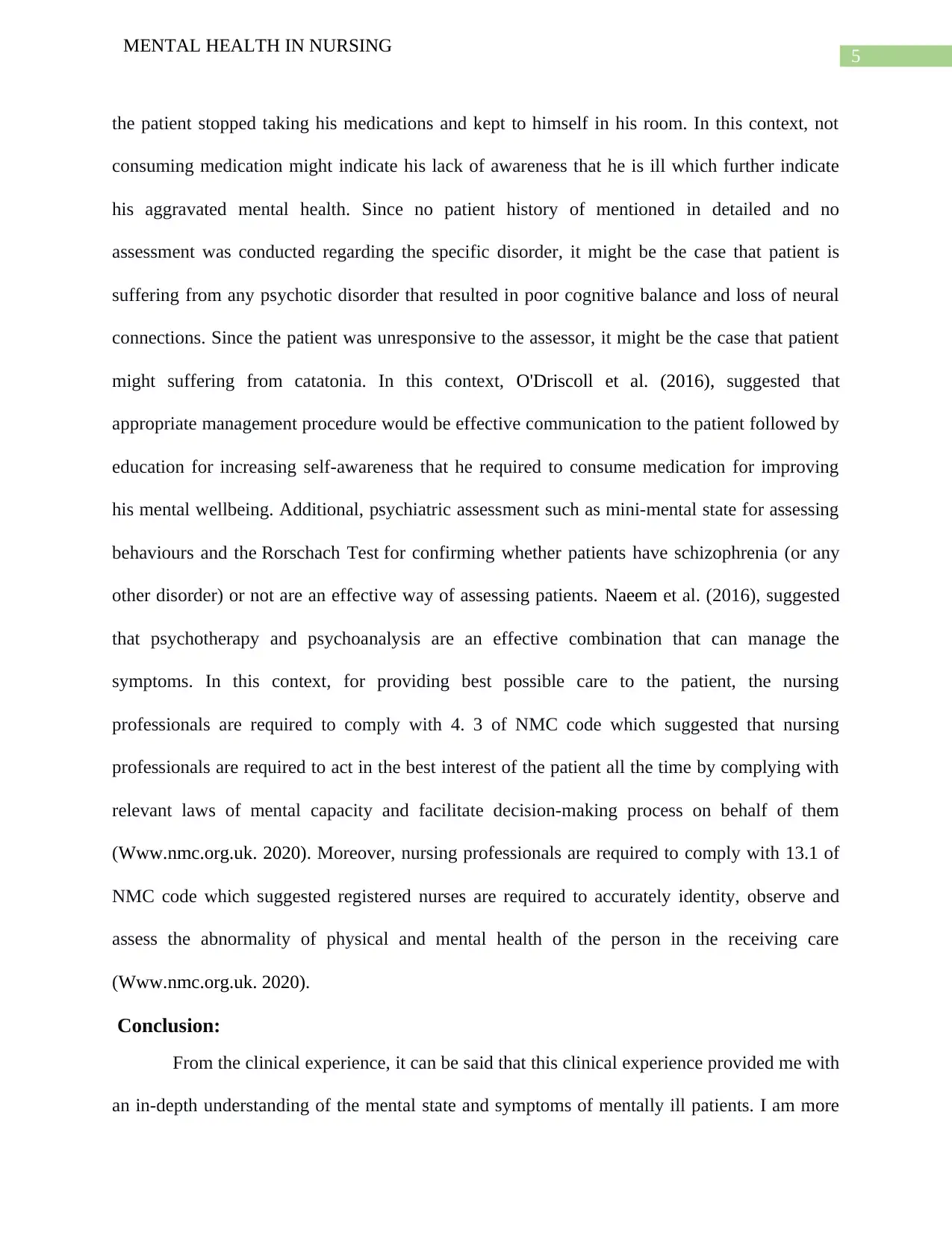
5
MENTAL HEALTH IN NURSING
the patient stopped taking his medications and kept to himself in his room. In this context, not
consuming medication might indicate his lack of awareness that he is ill which further indicate
his aggravated mental health. Since no patient history of mentioned in detailed and no
assessment was conducted regarding the specific disorder, it might be the case that patient is
suffering from any psychotic disorder that resulted in poor cognitive balance and loss of neural
connections. Since the patient was unresponsive to the assessor, it might be the case that patient
might suffering from catatonia. In this context, O'Driscoll et al. (2016), suggested that
appropriate management procedure would be effective communication to the patient followed by
education for increasing self-awareness that he required to consume medication for improving
his mental wellbeing. Additional, psychiatric assessment such as mini-mental state for assessing
behaviours and the Rorschach Test for confirming whether patients have schizophrenia (or any
other disorder) or not are an effective way of assessing patients. Naeem et al. (2016), suggested
that psychotherapy and psychoanalysis are an effective combination that can manage the
symptoms. In this context, for providing best possible care to the patient, the nursing
professionals are required to comply with 4. 3 of NMC code which suggested that nursing
professionals are required to act in the best interest of the patient all the time by complying with
relevant laws of mental capacity and facilitate decision-making process on behalf of them
(Www.nmc.org.uk. 2020). Moreover, nursing professionals are required to comply with 13.1 of
NMC code which suggested registered nurses are required to accurately identity, observe and
assess the abnormality of physical and mental health of the person in the receiving care
(Www.nmc.org.uk. 2020).
Conclusion:
From the clinical experience, it can be said that this clinical experience provided me with
an in-depth understanding of the mental state and symptoms of mentally ill patients. I am more
MENTAL HEALTH IN NURSING
the patient stopped taking his medications and kept to himself in his room. In this context, not
consuming medication might indicate his lack of awareness that he is ill which further indicate
his aggravated mental health. Since no patient history of mentioned in detailed and no
assessment was conducted regarding the specific disorder, it might be the case that patient is
suffering from any psychotic disorder that resulted in poor cognitive balance and loss of neural
connections. Since the patient was unresponsive to the assessor, it might be the case that patient
might suffering from catatonia. In this context, O'Driscoll et al. (2016), suggested that
appropriate management procedure would be effective communication to the patient followed by
education for increasing self-awareness that he required to consume medication for improving
his mental wellbeing. Additional, psychiatric assessment such as mini-mental state for assessing
behaviours and the Rorschach Test for confirming whether patients have schizophrenia (or any
other disorder) or not are an effective way of assessing patients. Naeem et al. (2016), suggested
that psychotherapy and psychoanalysis are an effective combination that can manage the
symptoms. In this context, for providing best possible care to the patient, the nursing
professionals are required to comply with 4. 3 of NMC code which suggested that nursing
professionals are required to act in the best interest of the patient all the time by complying with
relevant laws of mental capacity and facilitate decision-making process on behalf of them
(Www.nmc.org.uk. 2020). Moreover, nursing professionals are required to comply with 13.1 of
NMC code which suggested registered nurses are required to accurately identity, observe and
assess the abnormality of physical and mental health of the person in the receiving care
(Www.nmc.org.uk. 2020).
Conclusion:
From the clinical experience, it can be said that this clinical experience provided me with
an in-depth understanding of the mental state and symptoms of mentally ill patients. I am more
⊘ This is a preview!⊘
Do you want full access?
Subscribe today to unlock all pages.

Trusted by 1+ million students worldwide
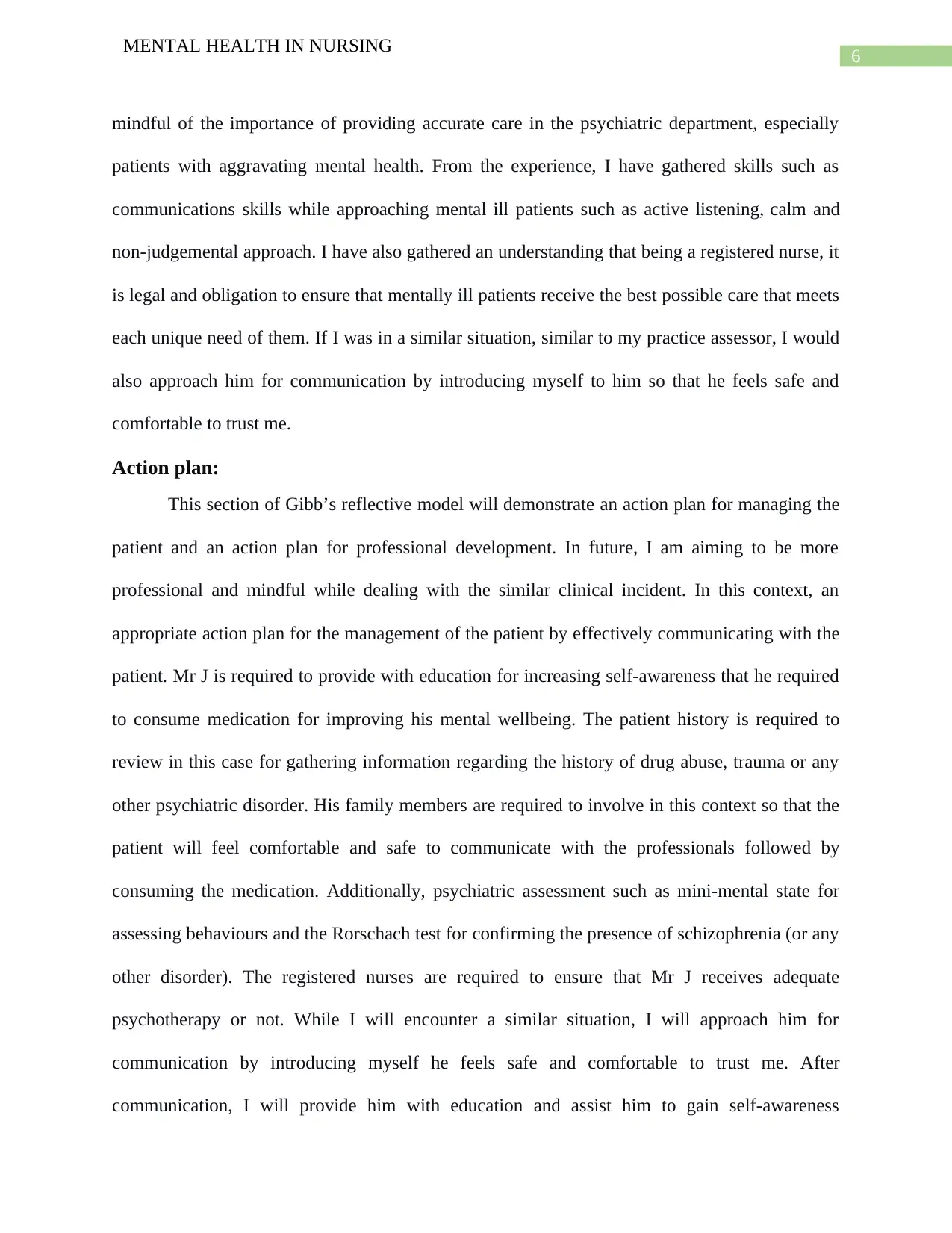
6
MENTAL HEALTH IN NURSING
mindful of the importance of providing accurate care in the psychiatric department, especially
patients with aggravating mental health. From the experience, I have gathered skills such as
communications skills while approaching mental ill patients such as active listening, calm and
non-judgemental approach. I have also gathered an understanding that being a registered nurse, it
is legal and obligation to ensure that mentally ill patients receive the best possible care that meets
each unique need of them. If I was in a similar situation, similar to my practice assessor, I would
also approach him for communication by introducing myself to him so that he feels safe and
comfortable to trust me.
Action plan:
This section of Gibb’s reflective model will demonstrate an action plan for managing the
patient and an action plan for professional development. In future, I am aiming to be more
professional and mindful while dealing with the similar clinical incident. In this context, an
appropriate action plan for the management of the patient by effectively communicating with the
patient. Mr J is required to provide with education for increasing self-awareness that he required
to consume medication for improving his mental wellbeing. The patient history is required to
review in this case for gathering information regarding the history of drug abuse, trauma or any
other psychiatric disorder. His family members are required to involve in this context so that the
patient will feel comfortable and safe to communicate with the professionals followed by
consuming the medication. Additionally, psychiatric assessment such as mini-mental state for
assessing behaviours and the Rorschach test for confirming the presence of schizophrenia (or any
other disorder). The registered nurses are required to ensure that Mr J receives adequate
psychotherapy or not. While I will encounter a similar situation, I will approach him for
communication by introducing myself he feels safe and comfortable to trust me. After
communication, I will provide him with education and assist him to gain self-awareness
MENTAL HEALTH IN NURSING
mindful of the importance of providing accurate care in the psychiatric department, especially
patients with aggravating mental health. From the experience, I have gathered skills such as
communications skills while approaching mental ill patients such as active listening, calm and
non-judgemental approach. I have also gathered an understanding that being a registered nurse, it
is legal and obligation to ensure that mentally ill patients receive the best possible care that meets
each unique need of them. If I was in a similar situation, similar to my practice assessor, I would
also approach him for communication by introducing myself to him so that he feels safe and
comfortable to trust me.
Action plan:
This section of Gibb’s reflective model will demonstrate an action plan for managing the
patient and an action plan for professional development. In future, I am aiming to be more
professional and mindful while dealing with the similar clinical incident. In this context, an
appropriate action plan for the management of the patient by effectively communicating with the
patient. Mr J is required to provide with education for increasing self-awareness that he required
to consume medication for improving his mental wellbeing. The patient history is required to
review in this case for gathering information regarding the history of drug abuse, trauma or any
other psychiatric disorder. His family members are required to involve in this context so that the
patient will feel comfortable and safe to communicate with the professionals followed by
consuming the medication. Additionally, psychiatric assessment such as mini-mental state for
assessing behaviours and the Rorschach test for confirming the presence of schizophrenia (or any
other disorder). The registered nurses are required to ensure that Mr J receives adequate
psychotherapy or not. While I will encounter a similar situation, I will approach him for
communication by introducing myself he feels safe and comfortable to trust me. After
communication, I will provide him with education and assist him to gain self-awareness
Paraphrase This Document
Need a fresh take? Get an instant paraphrase of this document with our AI Paraphraser
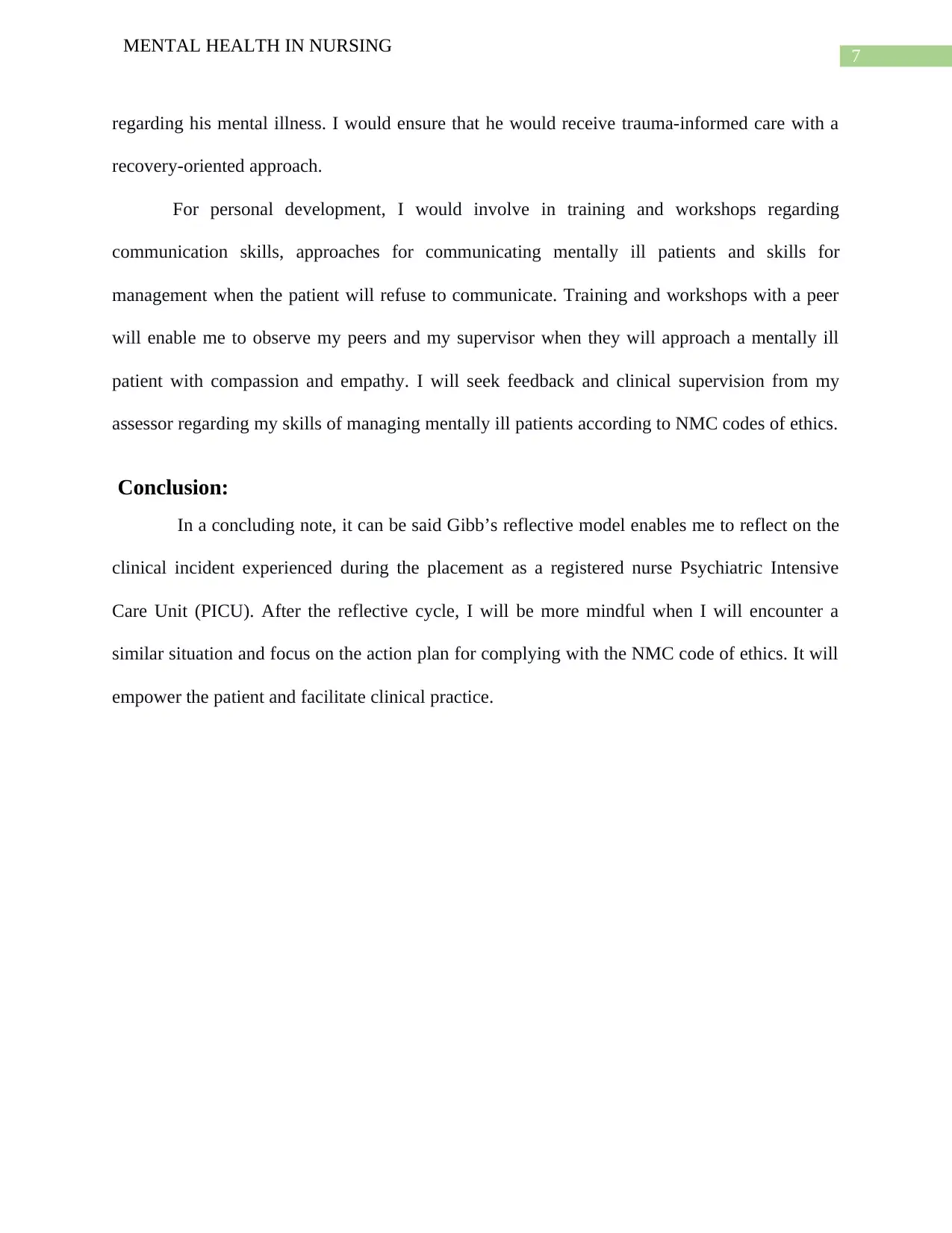
7
MENTAL HEALTH IN NURSING
regarding his mental illness. I would ensure that he would receive trauma-informed care with a
recovery-oriented approach.
For personal development, I would involve in training and workshops regarding
communication skills, approaches for communicating mentally ill patients and skills for
management when the patient will refuse to communicate. Training and workshops with a peer
will enable me to observe my peers and my supervisor when they will approach a mentally ill
patient with compassion and empathy. I will seek feedback and clinical supervision from my
assessor regarding my skills of managing mentally ill patients according to NMC codes of ethics.
Conclusion:
In a concluding note, it can be said Gibb’s reflective model enables me to reflect on the
clinical incident experienced during the placement as a registered nurse Psychiatric Intensive
Care Unit (PICU). After the reflective cycle, I will be more mindful when I will encounter a
similar situation and focus on the action plan for complying with the NMC code of ethics. It will
empower the patient and facilitate clinical practice.
MENTAL HEALTH IN NURSING
regarding his mental illness. I would ensure that he would receive trauma-informed care with a
recovery-oriented approach.
For personal development, I would involve in training and workshops regarding
communication skills, approaches for communicating mentally ill patients and skills for
management when the patient will refuse to communicate. Training and workshops with a peer
will enable me to observe my peers and my supervisor when they will approach a mentally ill
patient with compassion and empathy. I will seek feedback and clinical supervision from my
assessor regarding my skills of managing mentally ill patients according to NMC codes of ethics.
Conclusion:
In a concluding note, it can be said Gibb’s reflective model enables me to reflect on the
clinical incident experienced during the placement as a registered nurse Psychiatric Intensive
Care Unit (PICU). After the reflective cycle, I will be more mindful when I will encounter a
similar situation and focus on the action plan for complying with the NMC code of ethics. It will
empower the patient and facilitate clinical practice.
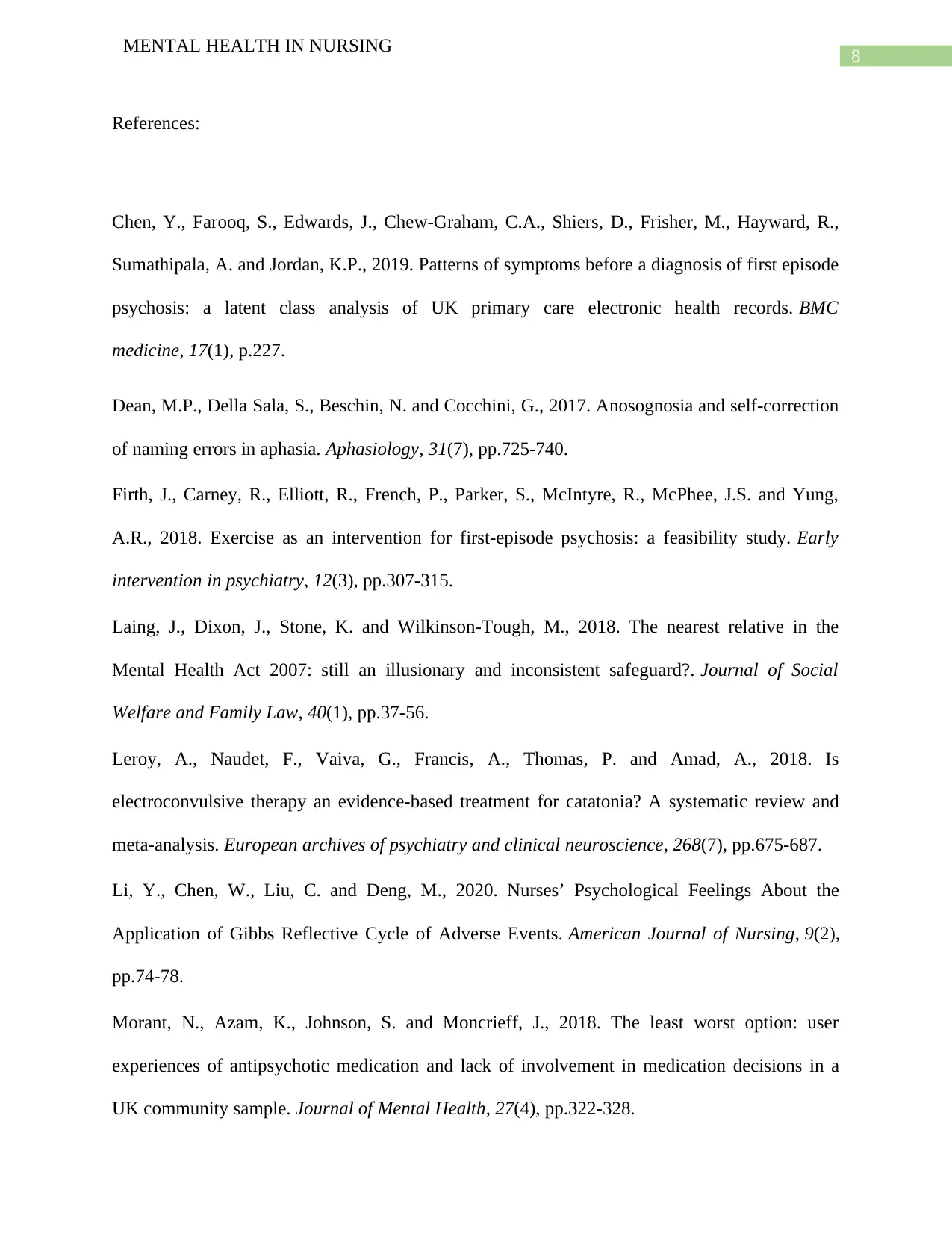
8
MENTAL HEALTH IN NURSING
References:
Chen, Y., Farooq, S., Edwards, J., Chew-Graham, C.A., Shiers, D., Frisher, M., Hayward, R.,
Sumathipala, A. and Jordan, K.P., 2019. Patterns of symptoms before a diagnosis of first episode
psychosis: a latent class analysis of UK primary care electronic health records. BMC
medicine, 17(1), p.227.
Dean, M.P., Della Sala, S., Beschin, N. and Cocchini, G., 2017. Anosognosia and self-correction
of naming errors in aphasia. Aphasiology, 31(7), pp.725-740.
Firth, J., Carney, R., Elliott, R., French, P., Parker, S., McIntyre, R., McPhee, J.S. and Yung,
A.R., 2018. Exercise as an intervention for first‐episode psychosis: a feasibility study. Early
intervention in psychiatry, 12(3), pp.307-315.
Laing, J., Dixon, J., Stone, K. and Wilkinson-Tough, M., 2018. The nearest relative in the
Mental Health Act 2007: still an illusionary and inconsistent safeguard?. Journal of Social
Welfare and Family Law, 40(1), pp.37-56.
Leroy, A., Naudet, F., Vaiva, G., Francis, A., Thomas, P. and Amad, A., 2018. Is
electroconvulsive therapy an evidence-based treatment for catatonia? A systematic review and
meta-analysis. European archives of psychiatry and clinical neuroscience, 268(7), pp.675-687.
Li, Y., Chen, W., Liu, C. and Deng, M., 2020. Nurses’ Psychological Feelings About the
Application of Gibbs Reflective Cycle of Adverse Events. American Journal of Nursing, 9(2),
pp.74-78.
Morant, N., Azam, K., Johnson, S. and Moncrieff, J., 2018. The least worst option: user
experiences of antipsychotic medication and lack of involvement in medication decisions in a
UK community sample. Journal of Mental Health, 27(4), pp.322-328.
MENTAL HEALTH IN NURSING
References:
Chen, Y., Farooq, S., Edwards, J., Chew-Graham, C.A., Shiers, D., Frisher, M., Hayward, R.,
Sumathipala, A. and Jordan, K.P., 2019. Patterns of symptoms before a diagnosis of first episode
psychosis: a latent class analysis of UK primary care electronic health records. BMC
medicine, 17(1), p.227.
Dean, M.P., Della Sala, S., Beschin, N. and Cocchini, G., 2017. Anosognosia and self-correction
of naming errors in aphasia. Aphasiology, 31(7), pp.725-740.
Firth, J., Carney, R., Elliott, R., French, P., Parker, S., McIntyre, R., McPhee, J.S. and Yung,
A.R., 2018. Exercise as an intervention for first‐episode psychosis: a feasibility study. Early
intervention in psychiatry, 12(3), pp.307-315.
Laing, J., Dixon, J., Stone, K. and Wilkinson-Tough, M., 2018. The nearest relative in the
Mental Health Act 2007: still an illusionary and inconsistent safeguard?. Journal of Social
Welfare and Family Law, 40(1), pp.37-56.
Leroy, A., Naudet, F., Vaiva, G., Francis, A., Thomas, P. and Amad, A., 2018. Is
electroconvulsive therapy an evidence-based treatment for catatonia? A systematic review and
meta-analysis. European archives of psychiatry and clinical neuroscience, 268(7), pp.675-687.
Li, Y., Chen, W., Liu, C. and Deng, M., 2020. Nurses’ Psychological Feelings About the
Application of Gibbs Reflective Cycle of Adverse Events. American Journal of Nursing, 9(2),
pp.74-78.
Morant, N., Azam, K., Johnson, S. and Moncrieff, J., 2018. The least worst option: user
experiences of antipsychotic medication and lack of involvement in medication decisions in a
UK community sample. Journal of Mental Health, 27(4), pp.322-328.
⊘ This is a preview!⊘
Do you want full access?
Subscribe today to unlock all pages.

Trusted by 1+ million students worldwide
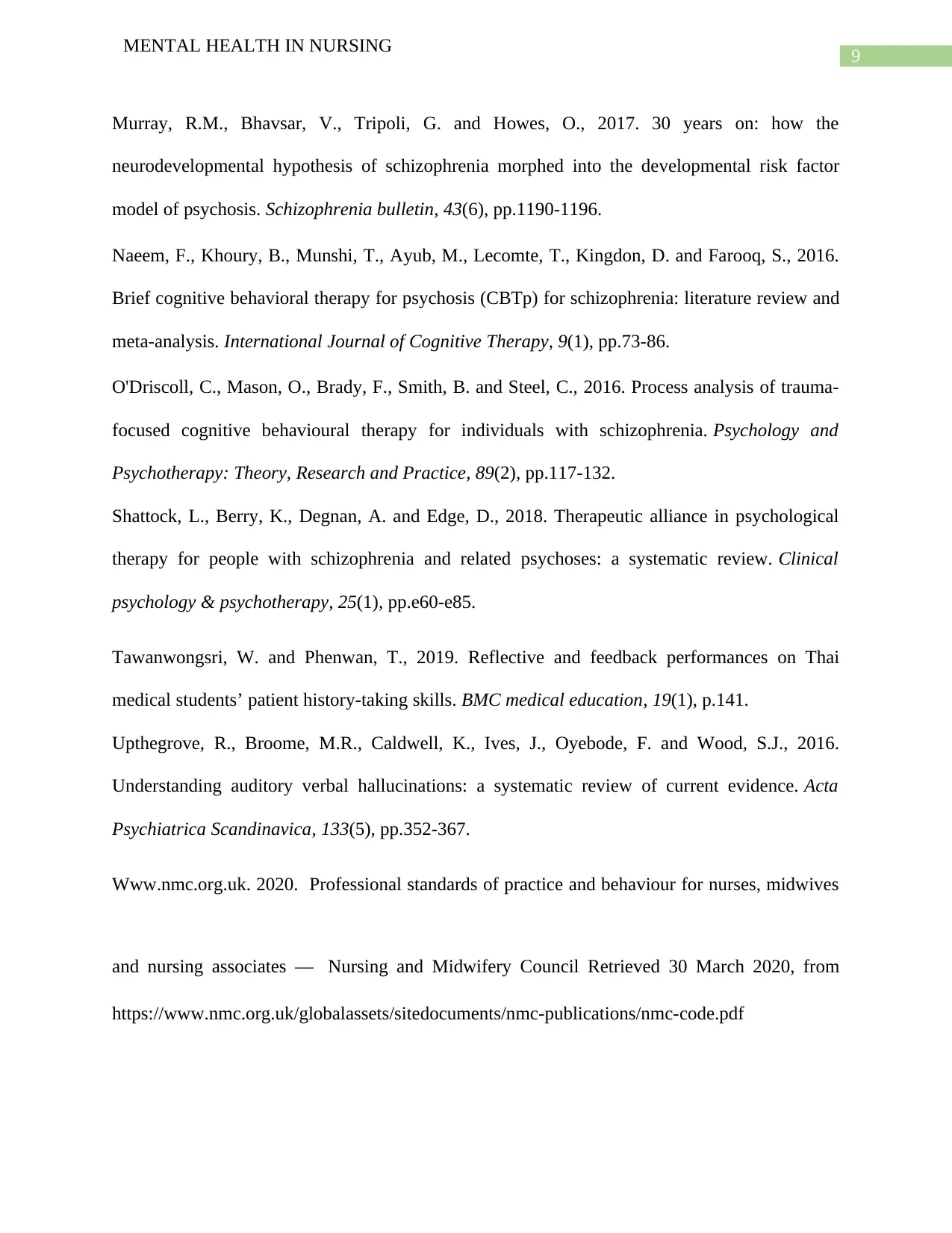
9
MENTAL HEALTH IN NURSING
Murray, R.M., Bhavsar, V., Tripoli, G. and Howes, O., 2017. 30 years on: how the
neurodevelopmental hypothesis of schizophrenia morphed into the developmental risk factor
model of psychosis. Schizophrenia bulletin, 43(6), pp.1190-1196.
Naeem, F., Khoury, B., Munshi, T., Ayub, M., Lecomte, T., Kingdon, D. and Farooq, S., 2016.
Brief cognitive behavioral therapy for psychosis (CBTp) for schizophrenia: literature review and
meta-analysis. International Journal of Cognitive Therapy, 9(1), pp.73-86.
O'Driscoll, C., Mason, O., Brady, F., Smith, B. and Steel, C., 2016. Process analysis of trauma‐
focused cognitive behavioural therapy for individuals with schizophrenia. Psychology and
Psychotherapy: Theory, Research and Practice, 89(2), pp.117-132.
Shattock, L., Berry, K., Degnan, A. and Edge, D., 2018. Therapeutic alliance in psychological
therapy for people with schizophrenia and related psychoses: a systematic review. Clinical
psychology & psychotherapy, 25(1), pp.e60-e85.
Tawanwongsri, W. and Phenwan, T., 2019. Reflective and feedback performances on Thai
medical students’ patient history-taking skills. BMC medical education, 19(1), p.141.
Upthegrove, R., Broome, M.R., Caldwell, K., Ives, J., Oyebode, F. and Wood, S.J., 2016.
Understanding auditory verbal hallucinations: a systematic review of current evidence. Acta
Psychiatrica Scandinavica, 133(5), pp.352-367.
Www.nmc.org.uk. 2020. Professional standards of practice and behaviour for nurses, midwives
and nursing associates — Nursing and Midwifery Council Retrieved 30 March 2020, from
https://www.nmc.org.uk/globalassets/sitedocuments/nmc-publications/nmc-code.pdf
MENTAL HEALTH IN NURSING
Murray, R.M., Bhavsar, V., Tripoli, G. and Howes, O., 2017. 30 years on: how the
neurodevelopmental hypothesis of schizophrenia morphed into the developmental risk factor
model of psychosis. Schizophrenia bulletin, 43(6), pp.1190-1196.
Naeem, F., Khoury, B., Munshi, T., Ayub, M., Lecomte, T., Kingdon, D. and Farooq, S., 2016.
Brief cognitive behavioral therapy for psychosis (CBTp) for schizophrenia: literature review and
meta-analysis. International Journal of Cognitive Therapy, 9(1), pp.73-86.
O'Driscoll, C., Mason, O., Brady, F., Smith, B. and Steel, C., 2016. Process analysis of trauma‐
focused cognitive behavioural therapy for individuals with schizophrenia. Psychology and
Psychotherapy: Theory, Research and Practice, 89(2), pp.117-132.
Shattock, L., Berry, K., Degnan, A. and Edge, D., 2018. Therapeutic alliance in psychological
therapy for people with schizophrenia and related psychoses: a systematic review. Clinical
psychology & psychotherapy, 25(1), pp.e60-e85.
Tawanwongsri, W. and Phenwan, T., 2019. Reflective and feedback performances on Thai
medical students’ patient history-taking skills. BMC medical education, 19(1), p.141.
Upthegrove, R., Broome, M.R., Caldwell, K., Ives, J., Oyebode, F. and Wood, S.J., 2016.
Understanding auditory verbal hallucinations: a systematic review of current evidence. Acta
Psychiatrica Scandinavica, 133(5), pp.352-367.
Www.nmc.org.uk. 2020. Professional standards of practice and behaviour for nurses, midwives
and nursing associates — Nursing and Midwifery Council Retrieved 30 March 2020, from
https://www.nmc.org.uk/globalassets/sitedocuments/nmc-publications/nmc-code.pdf
1 out of 10
Related Documents
Your All-in-One AI-Powered Toolkit for Academic Success.
+13062052269
info@desklib.com
Available 24*7 on WhatsApp / Email
![[object Object]](/_next/static/media/star-bottom.7253800d.svg)
Unlock your academic potential
Copyright © 2020–2026 A2Z Services. All Rights Reserved. Developed and managed by ZUCOL.





